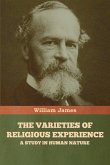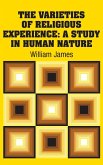William James' treatise on religious experiences attempts to cogently explain aspects of psychology related to mystical experiences. James was most interested in the direct experiences of people, which they and sometimes observers would afterwards claim as religious or spiritual in tone. Whether the experience was deemed a mystical connection, or as a sign of prophecy or other religious significance, and how these could translate into future significance in faiths - such as the designation of saintliness - are topics which concern the author. The book itself is divided into twenty different lectures, each of which focuses upon religion and its relation to psychology. James makes a distinction between religion conceived by a healthy mind, and religious experiences which denote some form of psychic malady or illness, a phenomenon James refers to as 'the sick soul'.
Hinweis: Dieser Artikel kann nur an eine deutsche Lieferadresse ausgeliefert werden.
Hinweis: Dieser Artikel kann nur an eine deutsche Lieferadresse ausgeliefert werden.







